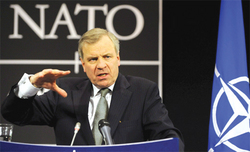 S ix months after breaking off talks with Russia after that country’s conflict with NATO-aspirant Georgia, the alliance has decided to resume relations, in a move some critics said was a cave-in to Russian aggression.
S ix months after breaking off talks with Russia after that country’s conflict with NATO-aspirant Georgia, the alliance has decided to resume relations, in a move some critics said was a cave-in to Russian aggression.
But NATO leaders said it was a sign of rapprochement between the West and Russia since the election of US President Barack Obama, after NATO foreign ministers met in Brussels.
While insisting that “fundamental differences” remain, “(NATO) ministers reached an agreement to formally resume the NATO-Russia Council (NRC),” said NATO Secretary General Jaap de Hoop Scheffer. “Russia is an important player, a global player. Not talking to them is not an option,” the NATO chief said.
Ministers stressed that the alliance was still deeply angered by Russia’s decision to invade Georgia and recognise its breakaway territories of Abkhazia and South Ossetia in August, but that Russia was more important than the conflict, and acknowledged they needed Russian help in providing alternative supply routes into Afghanistan, preventing the spread of weapons of mass destruction and stepping up the global fight against terrorism.
De Hoop Scheffer said NATO and Russian ministers would likely talk for the first time since NRC meetings were frozen over the August conflict in Georgia soon after the alliance’s April 3-4 summit in Strasbourg.
The news was greeted positively in Moscow, where a foreign ministry spokesman told the Interfax news agency that “common sense has finally prevailed.” US Secretary of State Hillary Rodham Clinton was at the meeting and sources close to the talks said she had been particularly vocal in stressing the need to “explore a fresh start” with Russia.
However, what had been portrayed as a formality ahead of the meeting quickly ran into trouble, with Lithuania initially stalling any progress. “I think it’s a bit premature to open formal dialogue.
I think we have to use this time before the summit and encourage Russia to be more cooperative on all the various questions which are a part of NATO security agenda,” Lithuanian Foreign Minister Vygaudas Usackas said at the start of the talks.
Lithuania’s concerns were echoed by Georgia and Ukraine, with the two former Soviet republics hastily convening meetings with NATO ministers.
Seeking to allay such concerns, de Hoop Scheffer reiterated NATO’s view that both countries should eventually be allowed to join the alliance. The decision to appease Russia came as Georgian officials accused Russia of repeatedly violating the country’s airspace, in a sign of the continued tensions in the region.
NATO ministers decided to suspend meetings of the NRC – the usual format for talks with Russia – on August 19 as a sign that there could be “no business as usual” with Moscow. But in recent months, the North Atlantic Treaty Organization’s 26 members have decided that it is time for the alliance to re-engage with Russia in order to tackle major international issues at a time of global economic crisis.
“NATO and Russia need to work together,” said Britain’s David Miliband, whose country has been traditionally wary of Moscow’s renewed assertiveness. The decision came on the back of reports of high-level contacts between Washington and Moscow over a controversial missile defence shield due to be built in Poland and the Czech Republic.
Moscow has perceived the shield, an idea of former US President George W Bush, as a direct threat to its nuclear deterrent. But in a recent hand-delivered letter to Russian President Dmitry Medvedev, Obama suggested that such a shield would not be needed if Iranian efforts to secure a nuclear bomb were halted.
The talks over Russia stole precious time from planned discussions on how to beef up the NATO-led International Security Assistance Force in Afghanistan and finalise its role in providing security during the August 20 presidential and provincial elections.
The US administration is currently busy finalising a strategic review of its nearly eight-year-old fight against the Taliban insurgency. Such a review is expected to emphasis the need to boost the civilian side of the US and NATO mission in Afghanistan and call for a regional solution to the problem.
Clinton proposed a regional conference on Afghanistan with key players such as NATO, the UN, Russia, India and Pakistan, that is expected to take place just days before the NATO summit.
 Eurasia Press & News
Eurasia Press & News
